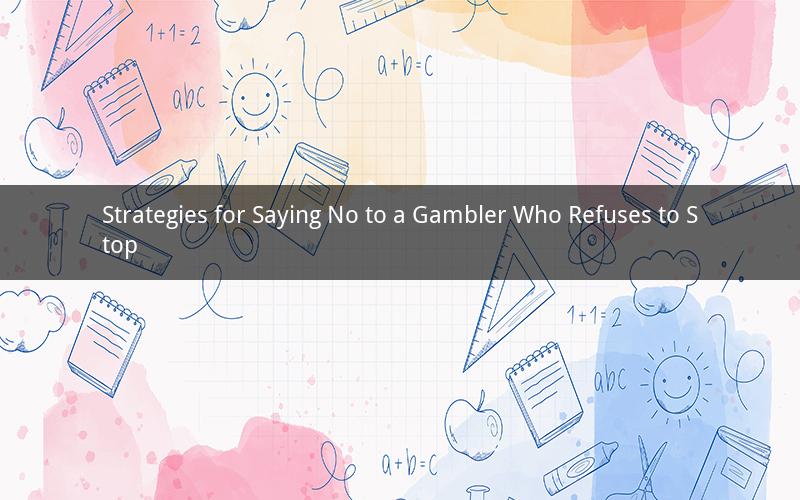
Introduction:
Gambling addiction is a serious issue that affects individuals and their families. When someone you know is struggling with gambling and refuses to seek help, it can be challenging to find the right way to say no. This article provides effective strategies for telling someone no when they want to keep gambling.
1. Understand the Problem:
Before you can effectively say no, it's crucial to understand the severity of the situation. Research the signs of gambling addiction, such as increased debt, neglecting responsibilities, and lying about gambling activities. Familiarize yourself with the consequences of continued gambling, including financial, emotional, and social repercussions.
2. Choose the Right Time and Place:
Timing is essential when trying to communicate with a gambler. Find a private and quiet setting where you can talk without interruptions. It's important to approach the conversation with empathy and understanding, as the person may be defensive or resistant to change.
3. Express Concerns Clearly and Calmly:
When discussing the issue, be direct and straightforward. Use "I" statements to express your concerns without placing blame. For example, say, "I'm worried about your financial situation" instead of "You're ruining your life with gambling." Maintain a calm demeanor to avoid escalating the situation into an argument.
4. Offer Support and Resources:
While it's important to say no, it's equally crucial to offer support and resources. Suggest seeking professional help from a therapist or counselor specializing in gambling addiction. Provide information about support groups and helplines that can assist the individual in their recovery journey. Assure them that you are there to support them throughout the process.
5. Set Boundaries:
Establish clear boundaries to protect yourself from the negative consequences of their gambling behavior. For instance, you may decide to limit your financial support or distance yourself from the individual until they commit to seeking help. Make sure to communicate these boundaries clearly and consistently.
6. Encourage Professional Help:
Encourage the person to seek professional help by emphasizing the benefits of therapy and support groups. Share success stories of others who have overcome gambling addiction to inspire them. Offer to accompany them to appointments or support group meetings to show your commitment to their recovery.
7. Be Patient and Persistent:
Changing behavior, especially in the case of addiction, takes time. Be patient and persistent in your efforts to help the individual. Understand that they may resist or struggle with the process initially. Continue to show your support and encourage them to take small, manageable steps towards recovery.
8. Take Care of Yourself:
It's crucial to prioritize your own well-being while helping someone with a gambling addiction. Seek support for yourself by attending support groups for loved ones of addicts or speaking with a therapist. Remember that you cannot force someone to change, but you can provide a supportive environment that encourages growth and recovery.
Questions and Answers:
1. Q: What if the person becomes angry or defensive when you try to say no?
A: Stay calm and composed. Listen to their concerns and validate their feelings. Reiterate your concerns and offer support without getting defensive. Remember, it's essential to maintain a respectful and empathetic approach.
2. Q: How can I help the person understand the seriousness of their gambling addiction?
A: Share specific examples of how their gambling has impacted their life, such as financial difficulties or strained relationships. Provide information about the consequences of continued gambling and encourage them to seek professional help.
3. Q: What if the person refuses to seek help or continues gambling despite your efforts?
A: It's important to set boundaries for your own well-being. Limit your financial support and distance yourself from the individual if necessary. Continue to offer support and encourage them to seek help, but remember that you cannot force them to change.
4. Q: How can I support the person during their recovery journey?
A: Offer your ongoing support by being a reliable presence in their life. Encourage them to attend therapy sessions and support group meetings. Celebrate their small victories and remind them of their progress.
5. Q: Is it possible to rebuild trust with someone who has a gambling addiction?
A: Rebuilding trust takes time and effort. Be patient and consistent in your actions. Show that you are committed to supporting their recovery and are willing to work through any trust issues that may arise. Remember, trust is rebuilt through consistent behavior and open communication.